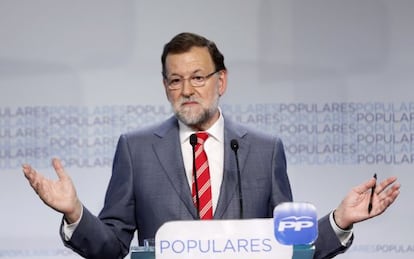PM rules out changes in government and PP and avoids self-criticism
In rare press conference, Rajoy blames poor election showing on failure to communicate Corruption also played a part in loss of power at Sunday’s polls, politician admits


After the poor showing of the Popular Party (PP) in Sunday’s regional and municipal elections – in which the conservative party remained the most-voted group but lost considerable support nationwide – Prime Minister Mariano Rajoy appeared before the press on Monday evening to offer his reactions.
The PP leader announced that he had taken a decision: that there was no need to change anything within his party, only to “be closer, and communicate more, with Spaniards.”
Rajoy will not change the structure or the composition of the government, nor the leadership of his party
His message was that he would be doing nothing to alter the structure or composition of the government, nor the leadership of his party, because in his opinion, the PP had done a great job in the difficult times of crisis in which the electorate had chosen them to lead.
Rajoy thus ignored calls from party leaders nationwide to engage in self-analysis and criticism, and stated that there would be no party conferences until after the general elections, due to take place later this year.
The Spanish prime minister went on to state that he felt it was still too early to enter into any analysis of the consequences of the disastrous showing for the PP on Sunday, which saw it lose its absolute majority in practically all of Spain’s regions, as well as suffering significant municipal losses, such as in Madrid and Valencia.
In a behind-closed-doors meeting with top party officials on Monday, the prime minister made clear that, despite being the most-voted party, the PP would have to make more of an effort to appear closer to the people of Spain and better explain what it has achieved during these years in power.
But leaders left the meeting with the idea that the party had made mistakes and that there must be more reasons underlying such a poor showing at the polls. Some officials even suggested that the first indications of a wave of opposition to the PP – “a party that generates rejection” – actually arrived a year ago, at the European elections in 2014. That was an opinion expressed by party figures such as Valencia regional premier Alberto Fabra and Extremadura premier José Antonio Monago, and even congressional speaker Jesús Posada. Many leaders stated that while Rajoy is aware of the party’s faults, he lacks proposals.
The PM said it was too early to enter into any analysis of the consequences of the disastrous showing for the PP
Rajoy’s appearance before the press on Monday was unusual – in the past he has received considerable criticism for not taking questions and for regularly appearing at press conferences via a TV feed. Monday’s meeting with reporters was an unannounced, last-minute affair, the type of which had not been seen at PP headquarters since May 28, 2012, when the PM was forced to publicly rule out a bailout request for Spain when the risk premium was running particularly high.
Among the messages Rajoy conveyed on Monday was that he was planning to work even harder in order to “win the next general elections.”
He attributed his party’s huge loss of power to three factors: corruption within the PP, the time it has taken for the economy to recover from the crisis and the lack of resources available to regional premiers. He was unwilling to criticize his own leadership of the party and of Spain, even when he was specifically asked about the issue. “I don’t have much to add,” he responded.
Tu suscripción se está usando en otro dispositivo
¿Quieres añadir otro usuario a tu suscripción?
Si continúas leyendo en este dispositivo, no se podrá leer en el otro.
FlechaTu suscripción se está usando en otro dispositivo y solo puedes acceder a EL PAÍS desde un dispositivo a la vez.
Si quieres compartir tu cuenta, cambia tu suscripción a la modalidad Premium, así podrás añadir otro usuario. Cada uno accederá con su propia cuenta de email, lo que os permitirá personalizar vuestra experiencia en EL PAÍS.
¿Tienes una suscripción de empresa? Accede aquí para contratar más cuentas.
En el caso de no saber quién está usando tu cuenta, te recomendamos cambiar tu contraseña aquí.
Si decides continuar compartiendo tu cuenta, este mensaje se mostrará en tu dispositivo y en el de la otra persona que está usando tu cuenta de forma indefinida, afectando a tu experiencia de lectura. Puedes consultar aquí los términos y condiciones de la suscripción digital.








































